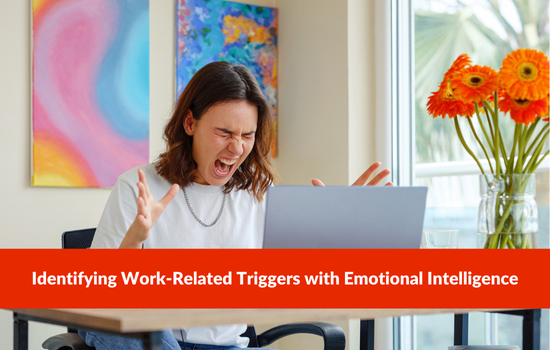Have you ever felt your heartbeat quicken as a deadline approaches or frustration build up during an unclear conversation with a colleague? These reactions aren’t just momentary stress, they stem from workplace triggers that can significantly impact your emotional intelligence, stress management, self-awareness, productivity, and overall job satisfaction.
How Emotional Intelligence Can Help You Recognize Workplace Triggers

Studies show that 90% of top performers have high emotional intelligence, enabling them to navigate professional challenges with composure and resilience. Developing self-awareness allows you to pinpoint specific workplace stress triggers before they escalate, empowering you to take control of your emotions and foster a more balanced, emotionally intelligent work environment.
Recognizing Work-Related Triggers
Understanding what provokes emotional responses is the first step in managing them. Emotional intelligence helps identify four key types of workplace stress triggers:
-
Work-Related Triggers
-
These arise from job-specific challenges and responsibilities, including:
-
Tight Deadlines – The pressure to complete tasks quickly can trigger stress and anxiety.
-
Unclear Communication – Vague instructions or shifting expectations can lead to frustration.
-
Complex Workplace Dynamics – Conflict with colleagues or supervisors can create emotional strain.
-
-
-
Environmental Triggers
-
The physical workspace can affect emotions, including:
-
Noisy Offices – Constant distractions can increase stress and reduce focus.
-
Uncomfortable Workspaces – Poor lighting, cramped spaces, or temperature discomfort can impact mood.
-
Lack of Privacy – Feeling watched or micromanaged can increase tension.
-
-
-
Social Triggers
-
Interactions with others—complicated ones—can provoke emotional reactions, such as:
-
Passive-Aggressive Behaviour – Unresolved workplace tension can lead to negative interactions.
-
Lack of Recognition – Feeling undervalued or ignored can lead to dissatisfaction.
-
Unclear Expectations from Leadership – Uncertainty in roles and responsibilities can trigger self-doubt.
-
-
-
Internal Triggers
-
Sometimes, our own beliefs and experiences serve as triggers:
-
Perfectionism – Setting unrealistic standards can result in chronic stress.
-
Fear of Failure – Anxiety over making mistakes can lead to avoidance behaviours.
-
Negative Self-Talk – Internal criticism can amplify emotional distress.
-
-
Strategies for Early Recognition of Triggers
-
Self-Awareness: Observe Your Reactions
-
Keep a journal to track situations that cause stress.
-
Recognize physical signs of stress (e.g., headaches, tension, restlessness).
-
Identify task, person, or situation patterns that consistently trigger strong emotions.
-
-
Emotional Regulation: Pause Before Reacting
-
Use mindfulness techniques like deep breathing or meditation.
-
Reframe negative thoughts into constructive problem-solving strategies.
-
Take short breaks to regain perspective before responding emotionally.
-
-
Social Awareness: Recognize External Cues
-
Observe how colleagues react to stress—do you share similar triggers?
-
Seek feedback from mentors or trusted coworkers about stressors.
-
-
Self-Management: Set Boundaries & Plan Ahead
-
Clarify expectations with managers early to avoid miscommunication.
-
Break projects into smaller tasks to reduce overwhelming pressure.
-
Establish healthy boundaries to prevent burnout and work overload.
-
Free Resource: Emotional Intelligence Workplace Triggers Checklist
Want to take the next step in managing workplace stress? Download our free Emotional Intelligence Workplace Triggers Checklist → click here. This practical tool will help you identify, track, and manage your stressors effectively.
By developing emotional intelligence, you can proactively recognize and navigate workplace triggers, leading to greater resilience and job satisfaction. For deeper insights into cultivating emotional intelligence, explore Linda Marshall’s latest book, The Mindful Journal: Cultivating Emotional Intelligence through Reflective Writing. Step into the power of emotional intelligence with The Power of Emotion.
More Motivational Reads Here »
How Emotionally Intelligent Are You?
Sign up for Linda’s monthly tips to build your Emotional Intelligence and reduce Emotional Hijacking!

















